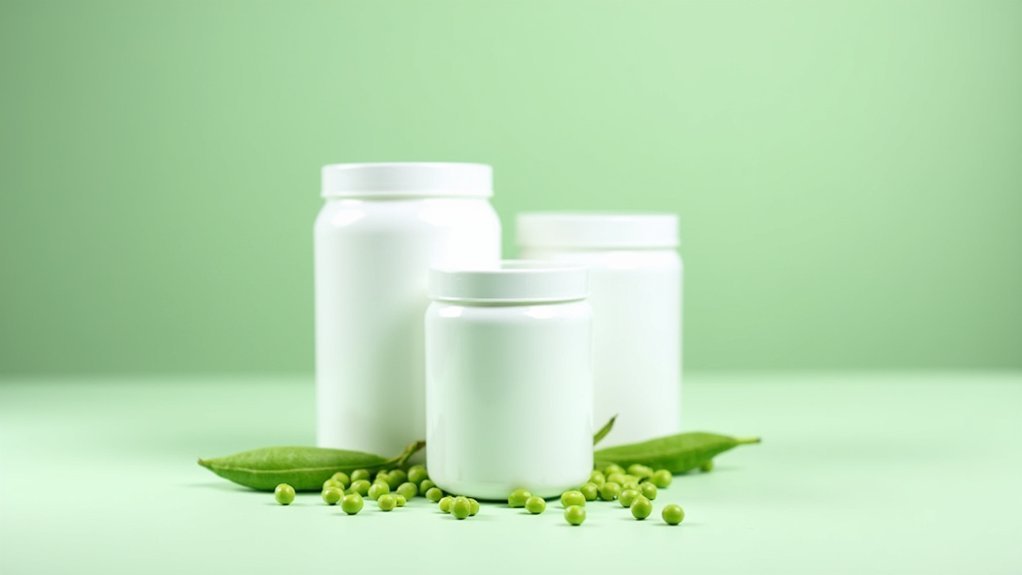You’ve likely experienced the frustration of protein powders that promise muscle gains but deliver digestive distress instead. If you’re dealing with sensitive digestion, you’re not alone in struggling to find a protein supplement that won’t leave you bloated or uncomfortable. Pea protein isolates have emerged as a game-changer for those seeking clean nutrition without the digestive aftermath. Three specific products stand out among nutritionists for their exceptional tolerance profiles.
NAKED Pea 5LB 100% Pea Protein Powder (76 Servings)
Since NAKED Pea contains only one ingredient—100% yellow pea protein with no additives, artificial sweeteners, or chemical processing—it’s your best choice if you’re dealing with digestive sensitivities triggered by common protein powder fillers. You’ll get 27g of complete protein per serving through mechanical water extraction that preserves purity. It’s GMO-free, soy-free, gluten-free, and dairy-free, sourced from North American farms. While the taste is neutral and slightly chalky, you can customize flavors with fruits or vegetables. The powder blends easily in cold water or milk, making it versatile for shakes and recipes without compromising digestive comfort.
Best For: People with digestive sensitivities or food allergies who need a clean, single-ingredient protein powder without artificial additives, sweeteners, or common allergens like dairy, soy, and gluten.
Pros:
- Contains only one ingredient (100% yellow pea protein) with no artificial additives, sweeteners, flavors, or colors
- Provides complete nutrition with 27g protein and 5.7g BCAAs per serving while being free from GMOs, soy, gluten, and dairy
- Uses chemical-free mechanical water extraction and is third-party tested for purity and quality
Cons:
- Has a neutral, slightly chalky taste that some users find unpalatable without added flavoring
- Mixed user reviews on taste preference, with some noting a strong pea flavor
- Requires customization with fruits or vegetables to improve flavor profile
Zammex Organic Pea Protein Powder, 26g Proteins Per Serving (2.62lbs, Natural Flavor)
Zammex Organic Pea Protein Powder delivers exceptional digestive comfort through its single-ingredient formula that’s perfect for people with sensitive stomachs who struggle with complex protein blends. You’ll get 26g of complete protein with all 18 amino acids, including 5.1g BCAAs, from USDA organic yellow peas. The partially hydrolyzed technology creates smoother texture that won’t cause bloating or digestive upset. You can easily blend it into smoothies, coffee, or baked goods to mask the natural pea flavor. The company backs their product with a satisfaction guarantee, making it a risk-free choice for digestive-sensitive individuals.
Best For: People with sensitive stomachs or digestive issues who need a clean, single-ingredient vegan protein powder that’s easy to digest and free from additives and allergens.
Pros:
- Single organic ingredient formula with 26g complete protein and all 18 amino acids for optimal muscle support
- Partially hydrolyzed technology creates smoother texture and enhanced digestibility compared to regular pea proteins
- Satisfaction guarantee with responsive customer service that offers refunds or replacements for unsatisfied customers
Cons:
- Strong natural pea flavor that requires mixing with other ingredients like fruits or chocolate to make it palatable
- Tends to clump when mixed with fatty liquids, limiting preparation options
- Limited flavor options with only natural flavor available, which some users find unpleasant on its own
Designs for Health PurePea – 20g Vegan Pea Protein Supplement, Vanilla (450g)
Designs for Health PurePea delivers exceptional digestive comfort for those struggling with traditional protein powders, thanks to its natural fermentation process that eliminates harsh chemical solvents. You’ll get 20g of highly bioavailable protein per serving from North American yellow peas, making it perfect if you’re dealing with milk allergies or lactose intolerance. The vanilla flavor provides pleasant taste without digestive upset. You’re choosing a non-GMO, gluten-free option that’s trusted by functional medicine professionals as their #1 recommended supplement brand. With strict quality standards and superior tolerability, it’s ideal for sensitive digestive systems.
Best For: Individuals with milk allergies, lactose intolerance, or sensitive digestive systems who need a high-quality vegan protein supplement with superior tolerability.
Pros:
- 20g of highly bioavailable protein from North American yellow peas with natural fermentation process for better digestibility
- Non-GMO, gluten-free, and free from chemical solvents, making it safe for those with multiple dietary restrictions
- Trusted by functional medicine professionals as the #1 recommended supplement brand with strict quality standards
Cons:
- Only 15 servings per container, which may require frequent repurchasing for regular users
- Limited flavor options with only three varieties available (chocolate, vanilla, unflavored)
- May be more expensive than conventional whey or other plant protein alternatives
Factors to Consider When Choosing Pea Protein Isolates for Digestive Sensitivity
When you’re selecting a pea protein isolate for digestive sensitivity, you’ll want to focus on how the product’s manufactured and what’s included in the formula. Look for single-ingredient products that use chemical-free extraction methods, as these processing approaches can greatly influence how well your digestive system tolerates the protein. You’ll also need to take into account factors like organic certification, texture quality, and how easily the powder mixes to guarantee you’re getting a product that works for your specific needs.
Processing Method Matters
The method manufacturers use to extract and process pea protein isolates directly affects how your digestive system responds to the final product. You’ll want to look for mechanical extraction methods rather than chemical processes, as these typically cause fewer digestive issues. Partially hydrolyzed pea proteins that undergo enzymatic treatment can greatly enhance digestibility and reduce that unpleasant gritty texture that bothers sensitive stomachs.
Choose products without additives and artificial ingredients, as cleaner formulations are less likely to trigger digestive sensitivities. High-quality isolates produced under strict standards minimize anti-nutritional factors that cause discomfort. Thorough testing and quality assurance during production guarantee the final product remains free from contaminants that could worsen your digestive sensitivity issues.
Single Ingredient Formulas
Simplicity proves invaluable when you’re dealing with digestive sensitivities. Single ingredient pea protein formulas eliminate potential triggers by containing only pure pea protein sourced from yellow peas, without additives, artificial sweeteners, or preservatives that could upset your stomach.
You’ll find these products are naturally gentle and easy to digest. They offer balanced amino acids, including essential BCAAs for muscle recovery, without unnecessary fillers that might cause adverse reactions. Single ingredient formulas help you better control your dietary intake while minimizing exposure to common allergens found in multi-ingredient powders.
These isolates typically contain lower fiber levels compared to blends, making them particularly suitable if you have a sensitive digestive system that struggles with higher fiber content.
Chemical-Free Extraction Methods
Manufacturing processes matter considerably when you’re selecting pea protein isolates for sensitive digestion. Chemical-free extraction methods, particularly mechanical water extraction, eliminate harmful solvents that can trigger digestive issues. You’ll benefit from higher bioavailability since these natural processes preserve protein integrity and essential nutrients.
When you choose products using chemical-free extraction, you’re getting fewer additives and fillers that commonly cause digestive discomfort. The absence of chemical residues makes these proteins more digestible for sensitive systems. You’ll also notice these products typically feature single-ingredient compositions, reducing your exposure to potential allergens and irritants.
Look for manufacturers who specifically mention mechanical extraction or water-based processing on their labels. This cleaner approach to production translates directly into better tolerance and reduced digestive sensitivity reactions.
Organic Certification Benefits
Beyond extraction methods, organic certification provides another layer of protection for your sensitive digestive system. USDA organic certification guarantees pea protein isolates are produced without synthetic pesticides, herbicides, or fertilizers that could trigger digestive discomfort. You’ll benefit from stricter farming practices that often result in higher quality protein sources with fewer harmful residues.
Organic pea protein isolates typically undergo less processing and contain no artificial additives, reducing your risk of chemical-related digestive issues. Since they’re sourced from non-GMO peas, they may be gentler on sensitive stomachs. The rigorous testing required for organic certification also screens for contaminants that could upset your digestive system, giving you additional confidence in your protein choice.
Texture and Mixing
When you’re dealing with digestive sensitivity, the texture and mixing characteristics of your pea protein isolate can greatly impact your overall tolerance and experience. Look for brands that offer smoother blends through partial hydrolyzation, which reduces grittiness and improves mouthfeel. You’ll want isolates that blend easily in water or non-fatty liquids, as these tend to be better tolerated by sensitive digestive systems.
Use cold water when mixing, as this improves both taste and texture. Avoid fatty liquids since they can cause clumping, making the protein less palatable and harder to digest. If you’re struggling with taste, combine your pea protein with stronger flavors like fruits or chocolate to mask any unpleasant notes while potentially aiding digestion.
Additive-Free Products
Three key ingredients lists separate truly additive-free pea protein isolates from products that might trigger your digestive sensitivities. You’ll want products containing only 100% yellow pea protein, eliminating artificial flavors, sweeteners, and preservatives that commonly cause digestive disturbances. This minimal ingredient approach considerably reduces your risk of allergic reactions while enhancing protein digestibility and absorption.
When you’re shopping, prioritize products with non-GMO and organic certifications. These labels guarantee you’re getting the purest form of pea protein without potentially harmful additives or genetic modifications. Look for clear labeling that explicitly states “additive-free” or “no artificial ingredients.” The cleaner the ingredient list, the better your sensitive digestive system will tolerate the protein supplement, allowing you to focus on muscle recovery and nutrition goals.
Third-Party Testing Standards
Independent laboratory verification provides the ultimate protection for your digestive system when selecting pea protein isolates. Third-party testing guarantees your supplement is free from heavy metals, pesticides, and harmful microbes that could trigger digestive issues. You’ll also get verified confirmation of the protein content and amino acid profile listed on the label.
Look for products with independent testing that identifies potential allergens or additives that might aggravate your sensitivities. This transparency helps you avoid ingredients that could cause digestive discomfort. Certifications from reputable third-party organizations indicate strict adherence to safety and quality standards.
Choose brands that regularly submit their products for independent lab analysis. This ongoing quality assurance demonstrates their commitment to providing clean, pure pea protein isolates suitable for sensitive digestive systems.
Frequently Asked Questions
Can Pea Protein Isolates Cause Bloating in People With IBS?
You might experience bloating from pea protein isolates if you have IBS, since they contain oligosaccharides that can trigger digestive symptoms. Start with smaller doses and choose high-quality isolates for better tolerance.
How Long Does It Take to See Digestive Improvements With Pea Protein?
You’ll typically notice digestive improvements within 1-2 weeks of switching to pea protein. Your gut needs time to adjust, so don’t expect instant results. Some people see changes sooner, while others need a full month.
Are There Any Medications That Interact With Pea Protein Supplements?
You shouldn’t experience major medication interactions with pea protein, but it’s wise to consult your doctor if you’re taking blood thinners or diabetes medications, since protein can affect absorption timing.
Can Children With Digestive Sensitivity Safely Consume Pea Protein Isolates?
You should consult your child’s pediatrician before introducing pea protein isolates. While they’re generally gentler than dairy proteins, children’s digestive systems vary considerably, and professional guidance guarantees safe, appropriate supplementation for your child’s specific needs.
Should I Take Probiotics Alongside Pea Protein for Better Digestion?
You can take probiotics with pea protein to support digestive health. They’ll help break down protein and maintain gut balance. Start with a basic probiotic blend and monitor how you feel after meals.





Leave a Reply